August 20, 2017
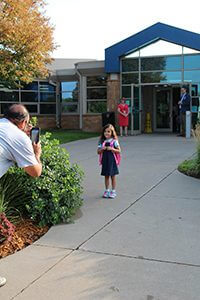 It seems like just yesterday we were sharing, Ideas for a Learning-Rich Summer. Now, here we are preparing for the start of school. The back-to-school transition is upon us, and our school community is bustling with excitement.
It seems like just yesterday we were sharing, Ideas for a Learning-Rich Summer. Now, here we are preparing for the start of school. The back-to-school transition is upon us, and our school community is bustling with excitement.
Everyone, children and adults alike, handles transition differently. Some people naturally embrace it, celebrating and welcoming the change. Others worry about the unknowns or focus on what they didn’t accomplish, instead of what they did, dampening their enthusiasm for what lies ahead.
Wherever you are on the back-to-school-enthusiasm spectrum—and we find that most Mounds Park Academy students and family are high on the scale—we hope that our Lower School families in particular will find some useful tips below as you prepare for the 2017-2018 academic year.
Celebrate The Summer
For parents of school-age children, particularly those in elementary school, summer days can swing from moments of pure joy to ones of frustration. You can wish for the summer to never end one minute, and then beg for late August to arrive the next. That’s why we think it’s important to reflect on the summer as a whole and celebrate the adventures, big and small, that made up your 2017 summer. Here are some suggested ways to celebrate the summer:
- Spend a carefree afternoon. Summer should include some relaxation, yet in today’s world, relaxation can be rare. So lounge by a lake, on a beach or in a hammock in these remaining days of summer and enjoy some quiet time.
- Create a photo book of summer memories. This could be as simple as creating a collage with photos printed on a home printer. Engage your child in its creation and reflect on their favorite parts of the summer.
- Draw pictures of your best family memory or write a story about it. Grab the crayons or the markers and some paper and draw or write away. Don’t let your child have all the fun, though. Release your inner
- Focus on what you accomplished, not what you didn’t. Many people start the summer with a long list of potential summer activities. Often we run out of time to pursue them all. Celebrate what you did do instead of starting the school year with a pang of we-didn’t-quite-get-to-that regret.
“I take time to reflect and write down everything I did (big or small) that I can remember. My list usually ends up being so long that I cannot believe I did so much in such a short time. I end up being very excited about all the things I did that summer and look forward to making a new school-year list.” – Karen Rossbach, MPA Lower School and Upper School Art Teacher
Read More
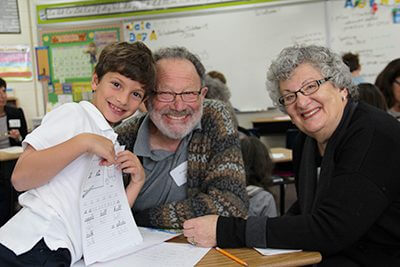 MPA grandparents and special friends are welcomed to a very joyful day on campus! Remind them to join PreK through 8th Grade students for a special glimpse inside the everyday life at MPA. Grandparents and Special Friends Day is Wednesday, October 18.
MPA grandparents and special friends are welcomed to a very joyful day on campus! Remind them to join PreK through 8th Grade students for a special glimpse inside the everyday life at MPA. Grandparents and Special Friends Day is Wednesday, October 18.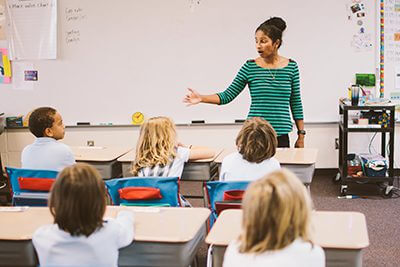 Fourth grade teacher
Fourth grade teacher Please mark your calendars and plan to attend this event on Thursday, October 5, 6:30-8 PM in the Recital Hall. Dr. Todd A. Savage, MPA parent and professor of school psychology at the University of Wisconsin-River Falls, and Dr. Scott Woitaszewski, also a professor of school psychology at UWRF, will be sharing a research- and evidence-based presentation that will further inform and equip our community regarding youth suicide awareness. They will help us all to be proactive and to understand the issue better, provide tips on what to look for in students, and give tools and resources to utilize if concerns arise. The final 15 minutes of the time together will be open for questions and answers and will allow MPA to share the resources that exist on our campus. The presentation is geared toward Middle and Upper School families; however, Lower School families are more than welcome to attend, as well. Note: This presentation will be similar to the one given in May. No RSVP needed.
Please mark your calendars and plan to attend this event on Thursday, October 5, 6:30-8 PM in the Recital Hall. Dr. Todd A. Savage, MPA parent and professor of school psychology at the University of Wisconsin-River Falls, and Dr. Scott Woitaszewski, also a professor of school psychology at UWRF, will be sharing a research- and evidence-based presentation that will further inform and equip our community regarding youth suicide awareness. They will help us all to be proactive and to understand the issue better, provide tips on what to look for in students, and give tools and resources to utilize if concerns arise. The final 15 minutes of the time together will be open for questions and answers and will allow MPA to share the resources that exist on our campus. The presentation is geared toward Middle and Upper School families; however, Lower School families are more than welcome to attend, as well. Note: This presentation will be similar to the one given in May. No RSVP needed.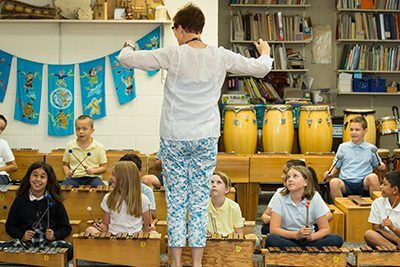 by Dr. Bill Hudson, Head of School
by Dr. Bill Hudson, Head of School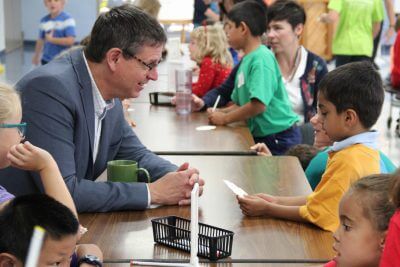 by Dr. Bill Hudson, Head of School
by Dr. Bill Hudson, Head of School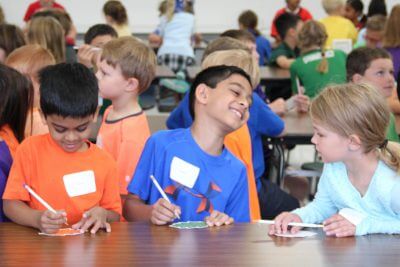 On September 13, a rainbow of MPA Lower School students excitedly awaited a big announcement at their first CHAMP assembly of the year. Everyone was dressed in red, orange, yellow, green, blue or purple to represent their grade levels, but all sat together to form a colorful audience for the reveal of a new CHAMP trait. The students cheered as one special word rang out in the cafeteria: courage.
On September 13, a rainbow of MPA Lower School students excitedly awaited a big announcement at their first CHAMP assembly of the year. Everyone was dressed in red, orange, yellow, green, blue or purple to represent their grade levels, but all sat together to form a colorful audience for the reveal of a new CHAMP trait. The students cheered as one special word rang out in the cafeteria: courage.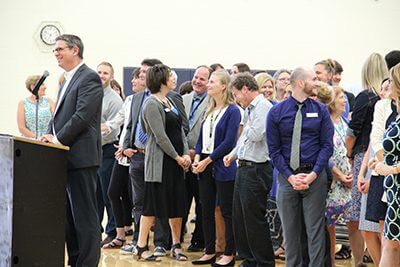 Welcome back to another school year at MPA! Believe it or not, Conference week is fast approaching, September 25-28, 2017. One longstanding tradition at MPA is to provide nourishment for the 100+ faculty and staff during this week. Our faculty and staff spend extra hours at school during this week and one way to help support them is to provide food all day long. (Dinners on Tuesday and Thursday nights that week are provided by the Parents Association directly).
Welcome back to another school year at MPA! Believe it or not, Conference week is fast approaching, September 25-28, 2017. One longstanding tradition at MPA is to provide nourishment for the 100+ faculty and staff during this week. Our faculty and staff spend extra hours at school during this week and one way to help support them is to provide food all day long. (Dinners on Tuesday and Thursday nights that week are provided by the Parents Association directly). It seems like just yesterday we were sharing,
It seems like just yesterday we were sharing,  Summer was made for students. That might sound counterintuitive for the head of an independent PreK–12 school to say, but please hear me out.
Summer was made for students. That might sound counterintuitive for the head of an independent PreK–12 school to say, but please hear me out.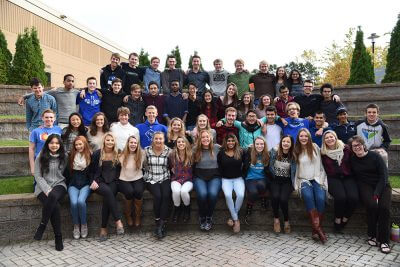 by Dr. Bill Hudson, Head of School
by Dr. Bill Hudson, Head of School